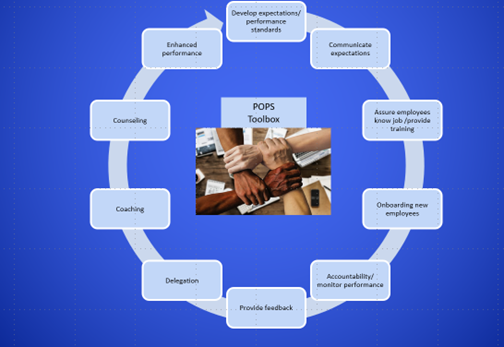101 LDR – Leaders’ Role In Leading Excellence and Continuous Improvement – Introduction to leadership and supervisory concepts and skills
Course Description
Description:
During Leaders’ Role In Leading Excellence and Continuous Improvement, you will gain will knowledge and skills that will enhance leadership, supervisory abilities and enhance performance. We will clarify and discuss your role as a leader. Since this is a workshop, we will spend a considerable part of the class discussing course content that is based on real-world workplaces and are relevant. During this course we will discuss and define what is leadership, supervision, and performance.
The course was designed and developed to inspire leaders to utilize the positive leadership philosophy that I have developed in actual working situations and utilized in training over 3,000 managers and supervisors:
“Creating and maintaining a positive and effective workplace based on trust and positive working relationships where team members are
self-motivated to do their best work to excel and to flourish”
Objective: At the completion of this session, you will be able to:
- Define the “why” of your leadership role and your impact on accomplishing your company’s mission and the need for excellence and continuous improvement.
- Define and discuss what are leadership and supervisory styles and determine your leadership style
- Clarify roles: What are the necessary skills, knowledge and behaviors of managers, supervisors, and employees and what skills, knowledge and behaviors to start, continue and stop.
- Building trust
- State and utilize delegation and accountability concepts and skills
- Explain and utilize motivation concepts and skills
- Review and discuss how to utilize concepts from Simen Sinek’s video: “Start with WHY”
- Introduce a performance management system to set and communicate expectations and to successfully meet company goals and continuous improvement
Course Content:
-

Leader’s Role in Pathways Towards Excellence
Understanding your role developing and maintaining excellence
- Develop an understanding of the “WHY” of your facility and your “WHY” as a leader – Discuss a leader’s role, your role in accomplishing your mission, and to create a coherent leadership team/system designed to create and maintain excellence
- Define and discuss leadership, management and supervision
- Clarify roles: The necessary skills, knowledge and behaviors of managers, supervisors, and employees, and the skills, knowledge and behaviors should they start, continue and stop
- Introduction to delegation
- Performance Management System (People-Oriented Performance System (POPS) to build teamwork, cooperation, and trust. Please review the POPs model listed to the right.
Audience: Leaders, managers, supervisors and employees
Format: Classroom, Instructor-led
Instructor: Peter Brunette, President, People Skills Development
Length: 4 – 4.5 hours
Contact: Peter Brunette, (207) 205 4102, click to email
Cost: NOTE: Financial support of up to a $1,200 match per frontline worker is available to Compact Members of the Harold Alfond Center for the Advancement of Maine’s Workforce. As a member, you have streamlined access to The Center’s services, which includes the ability to utilize our company as a third-party partner and vendor. If you have any questions, you can contact Diane Crocket a coordinator for the center.
Agenda:
Draft outline below
| 7:00 – 8:00 | Arrive and set up |
| 8:00- 8:45 | Manager welcomes and kick off Manager reviews mission statement and need for continuous improvement Introductions – Peter “Start with WHY” video to lead by Simen Sinek and PSD slides |
| 8:45 – 10:00 | Leader’s role at to accomplish mission and continuous improvement – Peter • Leadership and supervisory skills – Peter |
| 10:00 – 10:15 | Break |
| 10:15 – 12:15 | Clarify roles by asking what skills, knowledge and behaviors needed of managers, supervisors and employees – Peter • What are the skills to start, stop and continue for managers, supervisors, and employees • Introduce Performance Management |
| 12:15 – 12:30 | Evaluate course, next steps, course ends |

